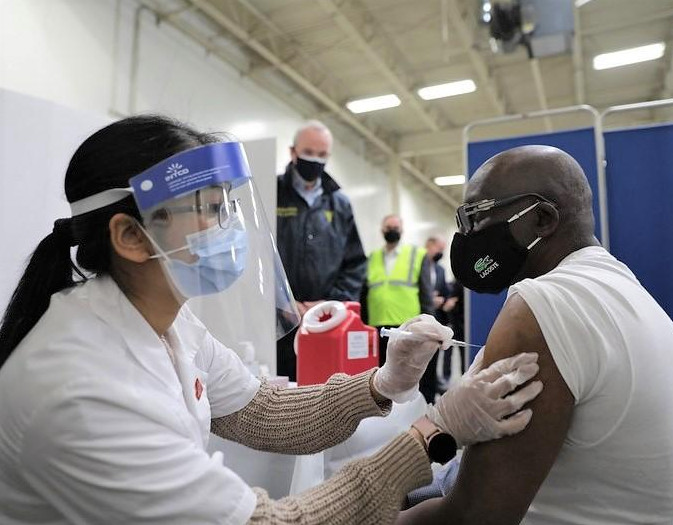The COVID-19 pandemic continues to affect thousands of people across the United States. Scientists have spent two years trying to achieve herd immunity by creating a national environment where the coronavirus stops spreading quickly. But the only real way to achieve herd immunity is for most of the American adult population to get vaccinated.
Unfortunately, recent polls indicate that nearly a quarter of all American adults don’t want to get any of the COVID-19 vaccinations available. In a country of almost 330 million people, having 25% of Americans unvaccinated makes it nearly impossible to achieve herd immunity.
Doctors are doing their best to convince their patients to get vaccinated, but their encouragement is still not changing enough people’s minds. Daily vaccine misinformation on television and social media is more powerful than spending a few minutes with a doctor every month. How can a patient change their mind after a brief medical session when watching several hours of vaccine propaganda each day? It is not easy.
That is why doctors need to develop stronger patient-care relationships where doctors answer their patients’ questions and treat them throughout all stages of the vaccination process. The achievement of this goal requires more time to be spent with patients than the usual two-minute doctor-patient session. Doctors and other medical care professionals must spend time talking with patients on a personal level and helping them understand the pros versus the cons when it comes to getting vaccinated.
Primary Medical Care Center has treated numerous patients with concerns about the COVID-19 vaccines. For example, some patients don’t want to get vaccinated because they think the vaccines were developed too quickly. Other patients think the vaccines cause infertility in women. Then, in more extreme cases, patients believe wild conspiracy theories about COVID-19 vaccines having microchips in them and magnetizing your skin.
So what is the solution for combating all this misinformation? We could tell patients that all the information they’ve received is false, but they aren’t so quick in believing what doctors tell them. It doesn’t matter if we show them facts and evidence to support our professional medical opinions. Sadly, skeptical patients would rather believe the advice of internet podcasters and news anchors who have no medical training whatsoever.
How to Interview a Patient About COVID-19 Vaccines
Motivational interviewing is our approach to helping patients overcome their skepticism. This approach requires the doctor to listen and focus on what the patient is saying. After that, the doctor provides factual information and professional advice to the patient. We have always done this whenever patients are skeptical about medical advice they’ve received elsewhere.
At Primary Medical Care Center, our doctors reinforce their expert opinions that vaccination is the best way to keep patients safe from getting sick with COVID-19. If a patient still doesn’t want to get vaccinated, we’ll ask them why not. The doctor will listen to their concerns and worries with respect and empathy. Then, we’ll use facts, data, and medical logic to show the patient why their concerns and worries are baseless.
There is no bullying or judgment involved here. Instead, our doctors show respect to patients without insulting or mocking their negative beliefs about the vaccines. After all, we understand how powerful false messaging can be from popular media figures with a national platform. It is easy for large groups of people to believe lies if prominent people are spewing them.
We attempt to overcome this messaging by letting our patients know that all our medical staff have been vaccinated and show no symptoms. We also reassure patients that we’ll take care of them before and after getting vaccinated. Our medical professionals will continue to monitor their health to ensure everything is fine. No patient will be alone throughout the process. That is our promise to them.
Primary Medical Care Center requires all its staff to undergo training on how to conduct effective motivational interviews with patients. The rise of COVID-19 vaccine skepticism has prompted us to tackle vaccine hesitancy with a more direct communicative approach between our medical staff and patients. Not only are our doctors required to undergo this training, but also our social workers, medical assistants, and nurses as well. That way, everyone on our staff can give quality advice and guidance to patients who are unsure about whether to get vaccinated.
Value-Based Care is the Answer
Primary care doctors must ditch the fee-for-service medical care model and replace it with the value-based care model. Value-based care incentivizes medical professionals to provide better quality care services via group panel discussions with the patients. If a patient hears the truth about COVID-19 vaccines from multiple medical professionals, they might be more willing to believe the truth.
Do you have personal questions about COVID-199 vaccines and their level of safety for your physical health? If so, you can call the medical professionals of Primary Medical Care Center at (305) 751-1500 to make an appointment to talk with one of our qualified doctors.
